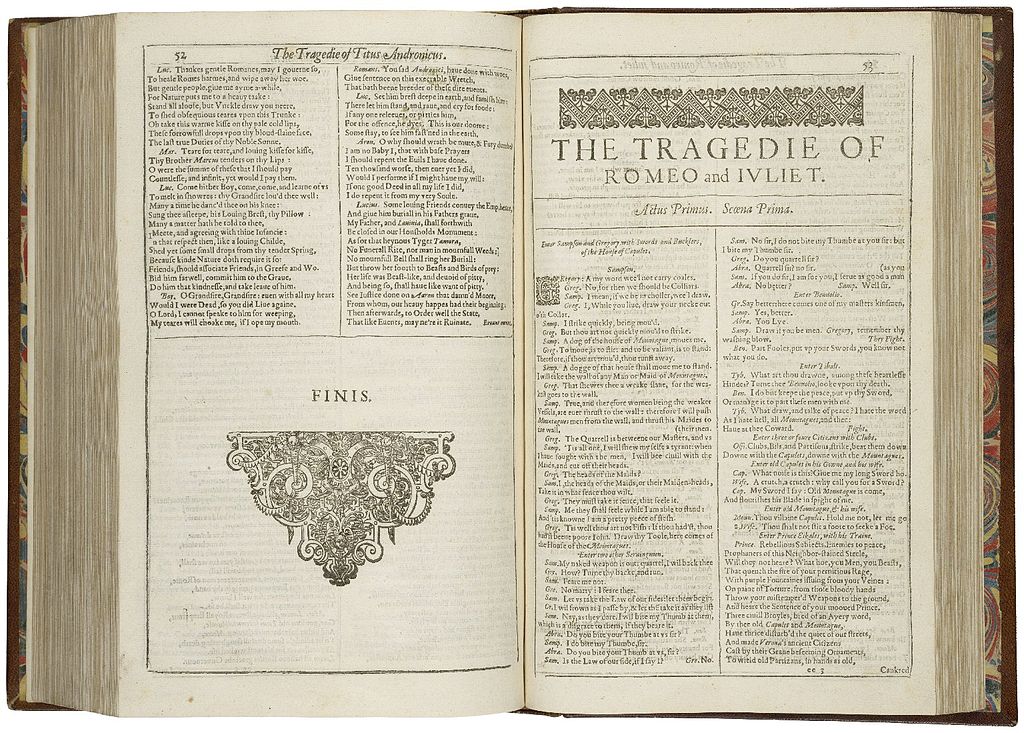
Act I continued
Scene 3
Observing Juliet and her mother interact in this scene, students realize that their relationship is formal and somewhat distant. The Nurse reacts in a more caring way than Lady Capulet to the proposal that Juliet should marry Count Paris. The Nurse lost her own daughter Susan and has cared for Juliet and been her companion from Juliet’s babyhood. Juliet appears to be closer to the Nurse than her mother. Most readers dislike the Nurse. She is garrulous, coarse, and annoying—both to the reader and to Lady Capulet. Juliet is a submissive daughter, but one wonders why Shakespeare made her so insipid.
Scene 4
This scene dramatizes a universal situation: Boisterous young men are on their way to a party. The lighted torches add to the festive mood. They are all wearing masks, as was the custom, a circumstance that hides Romeo’s identity from the Capulets. Shakespeare’s audience loved puns; Romeo’s speeches are full of them. To Mercutio’s assertion that he should dance at the party, Romeo responds, “You have dancing shoes / With nimble soles; I have a soul of lead / So stakes me to the ground I cannot move.” And when his light-hearted friend insists, he cries, “I am too sore enpiercèd with his shaft / To soar with his light feathers; and so bound / I cannot bound a pitch above dull woe.” [Italics added.]
The class should understand the function of foil characters. Both Benvolio and Mercutio are foils for Romeo since they both in different ways contrast with Romeo thus helping the reader to better understand his personality. Romeo is impractical unlike level-headed Benvolio; he is also overly emotional, a passionately romantic introvert, unlike Mercutio who is an extrovert and realistic about affairs of the heart: “If love be rough with you, be rough with love.” Both young men help us to better understand Romeo’s Petrarchan attitude to love. Mercutio loves to joke around, sometimes absurdly, often to excess. Although Mercutio is doing his best to cheer up his love-sick friend, the others get tired of his non-stop babbling about Queen Mab. One could also argue that Juliet’s suitor, the calm and rational Count Paris, is another foil for Romeo.
Shakespeare makes extensive use of foreshadowing. We are constantly aware of the lovers’ ultimate doom. On the way to the Capulets’ party, Romeo is full of misgivings about his future. His language suggests that Romeo is fatalist about future events. He explicitly refers to his “despisèd life” and “untimely death.” In the next scene, Juliet also is pessimistic about the lovers’ fate: “My grave is like to be my wedding bed.”
Scene 5
There isn’t much comic relief in this tragedy, but the servants’ frenetic preparations for the Capulets’ party provide a little. The dancing begins as our anticipation rises. At that point, Romeo sees Juliet: “I ne’er saw true beauty till this night.” From this moment, Romeo forgets Rosaline and falls passionately in love with Juliet. The initial romantic mood, however, is dashed as fiery Tybalt realizes that a hated Montague has crashed the party. Like any other host, Lord Capulet is annoyed by Tybalt’s noisy ranting and concerned that it will upset his guests; in any case, as far as Capulet is concerned, Romeo apparently intends no harm, so it’s easier for the old man to allow him to remain than force him to go. Tybalt is so infuriated that he leaves in a fury.
When the two young people begin to talk, Juliet doesn’t realize Romeo is a Montague since he’s wearing a mask. She is immediately attracted to his witty flirtation. High school students object to the suddenness of the couple’s falling in love and to Romeo’s switching his affections so rapidly. They should realize that Romeo is young and passionate and, as already mentioned, that Shakespeare probably includes Rosaline in the play to emphasize Romeo’s inability to handle his emotions with any maturity. If Benvolio had fallen in love with Juliet, the play would doubtless have been short and ended happily. As the party ends, the lovers are stunned that the object of their love is a hated enemy of their respective families. Why does Shakespeare makes the party so brief? Students should understand that the consummate dramatist allows nothing to diminish the tragedy that unfolds. All events focus on the tragic story of the “star-crossed lovers.” An Elizabethan audience would understand that to call the lovers “star-crossed” was to indicate that their lives were predestined by Fate to end tragically. However, students should realize that human error, particularly the parents’ interminable enmity, plays a significant part in the tragedy that unfolds. Although the lovers are doomed to die, their own actions and those of others play a significant role in causing their tragic deaths.
The major issues in Act I are these:
- exposition in the opening scene
- Tybalt’s character
- Benvolio and Mercutio as foils for Romeo
- complications for the lovers presented by Prince Escalus, Count Paris, and Tybalt
- foreshadowing
About the Author
Written by Elizabeth McCallum Marlow
I taught all aspects of the English curriculum at various colleges and private schools for 35 years. I now want to give back what I learned in the classroom about conveying to students a love for literature and a desire to write cogently. I would love to receive comments and questions that can be addressed to me at www.eamarlow0103@gmail.com.

